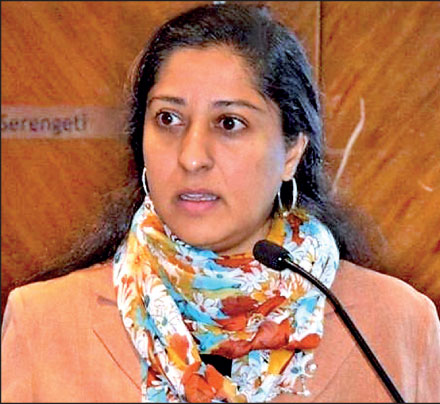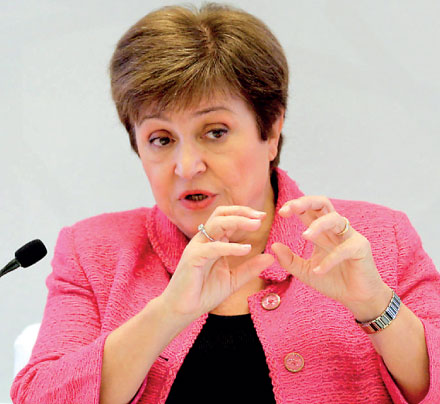Thursday Feb 12, 2026
Thursday Feb 12, 2026
Friday, 24 March 2023 01:54 - - {{hitsCtrl.values.hits}}

UN Independent Expert on Foreign Debt Attiya Waris

IMF Managing Director Kristalina Georgieva
 Soon after the UN Independent Expert on Foreign Debt, Other International Financial Obligations and Human Rights, Attiya Waris, Professor of Fiscal Law and Policy, took over her duties in August 2021, she wrote to the IMF Managing Director Kristalina Georgieva seeking information on the IMF’s operations relevant to her mandate. She felt that in order to resolve the “existential challenges” faced by the international community, it needed coordination of the UN specialised agencies for effective global governance.
Soon after the UN Independent Expert on Foreign Debt, Other International Financial Obligations and Human Rights, Attiya Waris, Professor of Fiscal Law and Policy, took over her duties in August 2021, she wrote to the IMF Managing Director Kristalina Georgieva seeking information on the IMF’s operations relevant to her mandate. She felt that in order to resolve the “existential challenges” faced by the international community, it needed coordination of the UN specialised agencies for effective global governance.
Replying to her letter of November 2021 in February last year, Georgieva effectively set out the limits of the IMF’s possible cooperation in terms of the UN expert’s suggestions, clarifying clearly and very usefully in the process, its raison d’etre which she specifically said was not to be a “developmental organization”.
This was stated in the context of a specific remark made by the Expert on Foreign Debt regarding accountability of the IMF staff. Waris was concerned that the IMF, like all others dealing with such challenges, “inevitably operates on the basis of imperfect knowledge and in dynamic and complex environments.” She felt that this suggested that as in all other international organisations “despite their best efforts, IMF staff…may sometimes err.”
In such cases, she wrote that “it raises concerns about the limited IMF accountability to those who may be adversely affected by its operations.” She suggested that the IMF should appoint an official “such as an independent ombudsperson” to investigate such complaints received from persons who believe that they have been harmed by IMF staff not sticking to their own policies and procedures.
Georgieva’s reply clarifies that the IMF has a “limited technical mandate” and “its purposes are all economic in nature”. She further states that its focus is on the promotion of “macroeconomic stability, economic growth, free international economic exchange and assisting members in addressing their balance of payments problems.” This is set out as the “outer limit of the IMF’s legal mandate” according to their Articles of Agreement.
She says in her reply that while the IMF is guided by a number of human rights concerns in its work including with regard to climate change, poverty reduction, social spending, gender parity and corruption, its mandate doesn’t extend to creating a mechanism to “address claims from non-state actors” as the “IMF is not a developmental agency, but rather makes its resources available only to governments of its members for their balance of payments support and does not finance individual projects”.
The IMF is clear that while it “recognizes and respects” and even “supports” human rights, in the words of the Managing Director, they do so “by helping member countries create an economic and institutional environment in which human rights can flourish”.
Is Parliament accountable?
A 2005 publication named ‘Accountability of the International Monetary Fund’ edited by Barry Carin and Angela Wood of the Centre for Global Studies, University of Victoria, Canada, had brought up the same issues posed to the IMF by UN Experts in 2021. The situation of accountability has remained the same and the issues remarkably unchanged and relevant, certainly in the case of Sri Lanka.
In its preface, under the heading ‘The Role of National Parliaments’, its conclusions are eerily familiar of Sri Lanka in 2023:
“Parliamentary engagement with the IMF will remain limited unless both the IMF and national governments at least permit, if not facilitate or require, parliaments to get involved. Although parliaments ought to be among the key stakeholders included in the Poverty Reduction Strategy process, the IMF’s Articles of Agreement limit its negotiating remit to the finance ministry and central bank governors. There is an obvious role for the IMF to play in informing, explaining and communicating information about economic policy to parliaments. However, currently there is much skepticism among parliamentarians about the impartiality of the Fund’s efforts in this regard.”
In Chapter 3, under the heading ‘Power and Responsibility’, it says:
“Critics hold the IMF accountable for policy choices because of its financial leverage, and because under the guise of its superior ‘technical know-how’ it is able to impose policies on weaker governments … against their wishes and often those of their citizens too. The perception is that the IMF continues to impose inappropriate or politically unacceptable policies because the Executive Board and the management and staff bear none of the burden of failed policy or the political consequences of imposing policies against the electorate’s will.”
What then of governments? It says:
“Governments are held to account at the ballot box, and dismissals (or resignations) of ministers and other senior staff are regularly meted out as a means of dealing with policy failings and public dissatisfaction. However, the IMF’s political leaders and senior managers do not face these political checks and balances. Nor has civil society recourse to national legal systems since, being an international institution, the IMF has legal immunity.”
It makes the valid point that if IMF programs were successful, there would be no calls for accountability. However, there are still calls for accountability because certain groups feel they are “adversely affected” by their policy prescriptions. The publication explains that:
“The problem for these groups is that IMF programs are determined outside national processes, which means it is not clear whether the government or the IMF is setting policy and, therefore, who is accountable. Moreover, it means that society’s views are often not taken into consideration in the policy setting process. This lack of transparency means that both governments and the IMF can avoid taking responsibility for decisions taken.”
Someone has to take responsibility. Here’s what the IMF thinks, according to the publication:
“The IMF is able to distance itself from taking responsibility for the consequences of its policy advice by claiming government ‘ownership’ of policies. Ownership implies that a government accepts the need for and willingly implements necessary reforms. It also implies that a government takes the decision to implement the policies specified in IMF program documents. This implies that the government is accountable for any misjudgment of policy; the IMF is simply an advisor in the background.”
Although this is not the end of the story and there’s still on-going discussions on the IMF’s accountability for its policy prescriptions, it’s best to know where the buck stops at least until the issue is decided satisfactorily.
Did our Government do its best in agreeing to the IMF programs? Or did they act as weak states do?
“Typically, governments with good analytical capacity are in a better position to advocate their own policies and negotiate with the IMF, and therefore may have greater ownership. Conversely, where capacity is limited, the IMF’s advice is more influential...This capacity is often in short supply in the poorest countries, thus even when new processes are intended to facilitate government ownership the IMF remains extremely influential.”
When it’s time to feel the pain however, it will be neither the IMF nor the politicians who will suffer, but the vast majority who weren’t consulted.
Holding the Government accountable is hardly possible for a people who are being denied democratic elections, which is the only way to let politicians know if they have gone too far.
International debt architecture
The tragedy of debt crises is neither that simple nor is it anywhere close to being resolved although efforts are underway to ensure that structural causes are addressed. This is beset with difficulties because such efforts aim to change nothing less than the world order itself. Independent experts of the United Nations such as those on Foreign Debt and other International Obligations, the Right to Development, On Poverty, on World Order etc. have made many interventions and are in correspondence with global financial organisations as well as member states to effect changes.
The Report of the previous UN Independent Expert on Foreign Debt on “International debt architecture reform and human rights” (A/76/167) presented at the76th session of the General Assembly makes several observations relevant to Sri Lanka:
The report makes several observations under the heading “Reform needed to resolve debt crises” which include:
Illicit financial flows
In a newspaper report it is alleged by the Commercial and Industrial Workers’ Union on behalf of the unions, civil society organisations, and professionals’ collective, that the Governor of the Central Bank, Dr. Nandalal Weerasinghe “disregarded and trivialized the extent of illicit financial flows through trade mis-invoicing in instigating Sri Lanka’s ongoing foreign exchange and fiscal crisis.”
They allege that at the Parliamentary Committee on Public Finance (COPF) meeting on 23 January, responding to questions raised by Parliamentarians on their statement at the COPF meeting, Dr. Weerasinghe allegedly said:
“Obviously, people who do under-invoicing or over-invoicing happen to basically evade taxes. If you have taxation, you declare a low value and pay low taxes and then they keep the money. They probably keep it out or bring it here – that’s their business. We don’t know…The other thing is, I don’t believe this number. The reason is if exporters are doing business here, they can’t keep that amount of money abroad.”
The Collective queries: “Why has the Government failed to move an inch on the observations and recommendations of institutions such as the IMF on illicit financial outflows? Why is the Government burying its head in the sand while its friends, the business elite, loot money out of this country and deny our country much-needed foreign exchange?”
Considering the new glow around the IMF at present, this is a good question and one that the IMF itself should ask the Government.